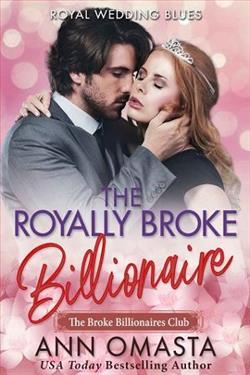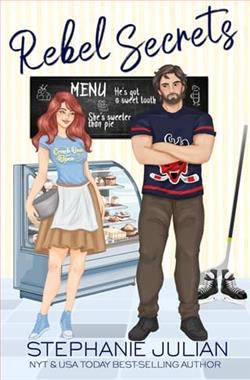Page 61 of Sunrise By the Sea
Chicken. Roasted chicken, with the waxed lemons from her care box rubbed over the skin; with far more cloves of garlic roasting than she could possibly need, just for greediness and the fact that, for all its hardships, it wasn’t a bad thing you weren’t going to run into people at close quarters when you’d eaten half a bulb of garlic.
Two steps. She was shaking all over.
And the night before. What had she had with the chicken, on a Sunday night when Nonna wouldn’t let her watch television because it was unholy on the Lord’s day and they’d had to listen to hymns and chat instead but somehow it hadn’t mattered so much because although in English she felt so awkward, such a failure, a mental health problem, someone off work, in Italian she felt simple and secure and basic. She could talk about food, and weather and listen to Nonna slag off the neighbours, which seemed a bit worse on a holy day but woe betide mentioning that.
And she was on step three.
Food. Food was helping. She thought hard. Back to a big plate – one of her earliest memories, truly a big plate of steaming seafood, in shells, that had seemed wondrous and a little frightening to her and Gino, and her grandfather had shown her how to scoop out the mussels with a little shell, hot and scented with garlic and lemon; and they had both discovered the delicious chewy strings of the deep-fried calamari, which they liked immediately, making squid faces at each other; too hot to eat, greasy, slippery and salty, but chewy too, exploding like sunshine in their mouths as their mother fussed around putting on sun cream and hats and forcing them under umbrellas and everyone went quiet and lay down for theirpisolinos, and a drowsy peace would descend over the beach and everyone there, and full of seafood and with the promise of an ice cream later if she lay quietly, curled up next to her beloved grandfather, Marisa would drift off . . .
She was in the road. The rain was pelting her, hard, the thunder still roaring overhead. She concentrated on the sound of the sea, the salt, even rough and ferocious as it was, provided her with the thinnest silvery line. Get out of your own way, she whispered to herself. Get out of your own way.
She kept that thinnest line between her memories, pulling her down the hill towards the water. Memories of happy meals with lots of people. Wonderful dinners when they’d all crammed round tiny student tables, everyone bringing a dish. Although as soon as they realised how much better Marisa was at cooking than the rest of them put together, they had eventually left her to it. A fragrant fish stew with the best part of a bottle of white wine in it. A perfect, plain-cooked salt cod eaten in Ischia with her last boyfriend but one. The rest of the holiday had been a disaster and they’d broken up but it was almost worth it for that fish, in her opinion. In fact it absolutely was. Just remember the happy things. Just think back. Get out . . . get out of your own way.
Her foot plunged ankle-deep into the running stream of the road, but she didn’t stop.
She clung tightly to the boxes she was carrying; inhaled their scent. Bread. Fresh bread on a camping trip with her family when they’d been washed out and had to spend the night in the car, turning up to the bakery as soon as it opened and the warm fragrance of the warm focaccia after a sleepless night. The slices of wedding cake that turned up weekly in the office, as grateful newly-weds remembered their ministrations – Nazreen hated fruit cake so the rest of the office normally got all of it, and Marisa loved marzipan, all year round.
The croissant marmalata that made them know that they were on holiday, the first things they always got, sometimes even at the airport as soon as they disembarked at Genoa, filled with sweet orange jam that you could never find at home; the announcement that you were here, where her mother would relax and feel at home, even though to her and Gino it was a foreign country.
Lucia had left Italy to make money and do well and raise her children and she had done all of those things.
But she had done them in the rain; in winters when the dark seemed to settle for months; where everyone worked all day and scurried home to lock themselves in sealed houses and watch television. When her mother first learned she got forty minutes at school for lunch, she thought it wouldn’t be physically possible. When one of Marisa’s friends came round for dinner and announced that she normally ate in front of the television, Lucia’s eyes nearly bugged out of her head; Marisa had heard her telling Nonna that night on the phone, who was convinced that doing that kind of thing would lead you straight to hell. Her father had said, before he left, that the British knew how to make money, but they didn’t know how to live.
But she, Marisa, loved her home country.
She loved Mars bars and Dick and Dom and going to Nando’s and eating fish fingers at six p.m. at her friends’ houses and talking about going to college and nobody remotely concerned about marrying a nice Catholic boy the family knew and settling down next door to everyone you’d ever known. She loved the amazing music and TV and the grand history and the jokes and all sorts of different people living hugger-mugger together; the beauty of the countryside, the down-to-earth people; her mother’s amazement that the DVLA actually worked.
She loved to visit Italy – but she was British. And while this saddened her mother, it delighted her grandfather, who was overjoyed at his proud independent grandchild, and would always squeeze her hand and tell her he was proud of her.
Marisa could see the villagers now down at the docks, hauling at rocks and sandbags, digging, and doing their best against the rising tide of water.
She had done it.
Chapter 39
She moved on, desperately looking for Alexei’s face; or at least a face she knew. She saw the blond man who was the father of Polly’s twins. His face was drawn and exhausted-looking.
She waved tentatively and he didn’t look pleased to see her.
‘Everyone should be indoors,’ he said in his American accent. ‘You shouldn’t be out unless you can help.’
Too timid to talk, Marisa held up her boxes.
‘Food.’
She opened the boxes and took out the kitchen roll and passed round the warm bread and as much tea as she could pour out.
The helpers fell on it with signs of enormous gratitude. Marisa found herself looking around for Alexei – he was normally easy to see – but he was over on the other side of the port trying to help move cars out of the way with several of the seamen, and didn’t seem to spot her.
‘This was brilliant,’ said Huckle, his mouth full. ‘Thank you. I’ll keep some for the others. You should get out of the weather.’
‘Can I help?’
‘You did.’
He looked at her.
‘Could you . . . could you possibly make some more? Maybe take it up for the old people? They’ll need breakfast.’















